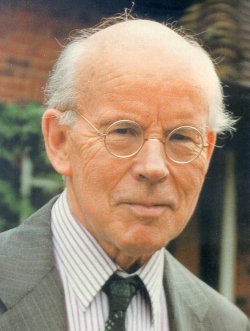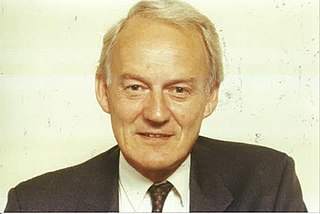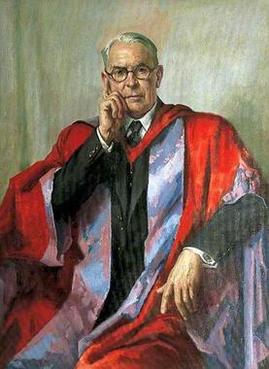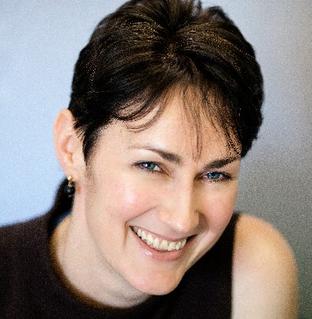
June Kathleen Lloyd, Baroness Lloyd of Highbury, DBE, FRCP, FRCP Edin, FRCGP was a British paediatrician and, in retirement, a cross bench member of the House of Lords. June Lloyd was a determined advocate for children's health and was instrumental in the establishment of the Royal College of Paediatrics and Child Health. In 1996 the college gained its royal status. She was also known for discovering that the damage caused to patients by the rare metabolic disease oQ-betalipoproteinaemia, that could be avoided by the use of Vitamin E. She was also known for discovering the role of lipid metabolism in health and disease in childhood, which was original and difficult to investigate at that time.
UCL Medical School is the medical school of University College London (UCL) and is located in London, United Kingdom. The school provides a wide range of undergraduate and postgraduate medical education programmes and also has a medical education research unit and an education consultancy unit. It is internationally renowned and is currently ranked 7th in the world by the QS World University Rankings 2022.

Marcus Edred Pembrey FMedSci is a British clinical geneticist with a research interest in non-Mendelian inheritance in humans. He is Emeritus Professor of Paediatric Genetics at UCL Great Ormond Street Institute of Child Health and Visiting Professor of Paediatric Genetics, University of Bristol. He featured in a 2005 'Horizon' program on BBC television called 'the Ghost in Your Genes'.

Sir John Peter Mills Tizard was a British paediatrician and professor at the University of Oxford. Tizard was principally notable for important research into neonatology and paediatric neurology and being a founder member of the Neonatal Society in 1959. Tizard was considered the most distinguished academic children's physician of his generation.

Great Ormond Street Hospital for Children NHS Foundation Trust runs Great Ormond Street Hospital. It is closely associated with University College London (UCL) and in partnership with the UCL Institute of Child Health, which it is located adjacent to, is the largest centre for research and postgraduate teaching in children’s health in Europe. It is part of both the Great Ormond Street Hospital/UCL Institute of Child Health Biomedical Research Centre and the UCL Partners academic health science centre.
Sir Terence John Stephenson, is a Northern Irish consultant paediatric doctor and chair of the Health Research Authority (HRA). He is also the Nuffield Professor of Child Health at University College London (UCL). Stephenson was most notable for guiding the RCPCH in agreeing 10 published national standards, Facing the Future: Standards for Paediatric Services. This was the first time the College committed publicly to a defined set of standards for all children receiving inpatient care or assessment across the UK.
Rosalind Louise Smyth CBE is an Irish-British paediatrician. She is Professor of Child Health at UCL the Director of the UCL Great Ormond Street Institute of Child Health from 2012 until 2022. She has been Vice Dean Research in the UCL Faculty of Population Health Sciences since 2022.

Sir David Hull was a British paediatrician. Hull was most notable for research and for a paper he published in 1963 in the Journal of Physiology with Michael Dawkins, about research into brown fat, an adipose-like tissue found in hibernating animals and in the human Infant and for later contributions considered outstanding in research conducted on Lipid metabolism and Thermoregulation.

Sir Alan Aird Moncrieff, was a British paediatrician and professor emeritus at University of London. He was most notable for developing the first premature-baby unit in 1947. It was Moncrief who recognised and developed the concept of daily parental visits to the ward, which he developed while at Great Ormond Street, well before the need for this became recognised, and with his ward sister, published an article on Hospital Visiting for Children in 1949.

Ronald Charles MacKeith FRCP was a British paediatrician. MacKeith was prolific in his endeavours. He was principally known for establishing the first cerebral palsy advice clinic, which was to become in 1964, the larger and more comprehensive Newcomen Centre for disabled children in Guy's Hospital. He founded the British Paediatric Neurology Association and the medical journal, Developmental Medicine & Child Neurology. His work gained recognition of the field of paediatric neurology as a science in several European countries.

Ronald Stanley Illingworth FRCP was a British born Yorkshireman and a paediatrician of renown. He was also a prolific writer, who wrote some 600 articles and at least 21 books, which were exceedingly popular and sold in large quantities. Illingworth was principally known for being largely responsible for introducing the science and practice of paediatrics to the UK in the early to mid-1940s.

Seymour Donald Mayneord Court, CBE, FRCSLT, FRCP, Hon FRCGP was a deeply religious British paediatrician who was known for his achievements in the fields of respiratory disease and the epidemiology of disease in childhood. He was also known for working, in a primary role, that established the importance of research into the social and behavioural aspects of illness in childhood.

Otto Herbert Wolff, was a German born medical scientist, paediatrician and was the Nuffield Professor of Child Health at Great Ormond Street Hospital. Wolff was notable for being one of the first paediatricians in Britain to set up a clinic for obese children. Later research into plasma lipids with Harold Salt pioneered the techniques of lipoprotein electrophoresis. He later conducted research into the role of lipid disturbance in childhood as a precursor of coronary artery disease and his recognition in 1960 of the rare condition of abetalipoproteinaemia. Wolff was also co-discoverer of the Edwards syndrome in abnormal chromosomes.
Andrew Wilkinson is a Professor Emeritus of Paediatrics and Perinatal Medicine at All Souls College, Oxford. Wilkinson is most notable for being an international authority in neonatology and a lead author of the Standards of Care for NICU and NICE guidelines on retinopathy of prematurity.

Maria Bitner-Glindzicz was a British medical doctor, honorary consultant in clinical genetics at Great Ormond Street Hospital, and a professor of human and molecular genetics at the UCL Institute of Child Health. The hospital described her work as relating to the "genetic causes of deafness in children and therapies that she hoped would one day restore vision." She researched Norrie disease and Usher syndrome, working with charities including Sparks and the Norrie Disease Foundation, and was one of the first colleagues involved in the 100,000 Genomes Project at Genomics England.
Lewis Spitz is a paediatric surgeon who is internationally recognised as a leader in paediatric surgery and is known for his work on congenital abnormalities of the oesophagus, particularly oesophageal atresia, oesophageal replacement and gastroesophageal reflux especially in neurologically impaired children. He championed the plight of children with cerebral palsy and other congenital disorders; demonstrating that appropriate surgery could improve their quality of life. He is the leading authority in the management of conjoined twins and is recognised as the foremost international expert in this field. Spitz is the Emeritus Nuffield Professor of Paediatric Surgery.
Judith Breuer is a British virologist who is professor of virology and director of the Pathogen Genomics Unit at University College London. She was elected a Fellow of the Academy of Medical Sciences in 2019. Breuer is part of the United Kingdom genome sequencing team that looks to map the spread of the coronavirus disease 2019.
Russell Mardon Viner, FMedSci is an Australian-British paediatrician, data scientist, policy researcher and Professor of Adolescent Health at the UCL Great Ormond Street Institute of Child Health. He is an expert on child and adolescent health in the UK and internationally. He was a member of the UK Government's Scientific Advisory Group for Emergencies (SAGE) during the COVID-19 pandemic and was President of the Royal College of Paediatrics and Child Health from 2018 to 2021. He remains clinically active, seeing young people with diabetes each week at UCL Hospitals. His research focuses on the health of children and young people, from global analyses of social determinants of health and global burden of disease (GBD), through use of ‘big’ routine data in children and young people’s healthcare, to conducting intervention studies both at the school level and clinical interventions in obesity and diabetes.
Dr Noor ul Owase Jeelani BMed.Sci (Hons), BMBS, MRCS, MBA, MPhil, FRCS (NeuroSurg.) is a Kashmiri-British neurosurgeon and academic. He is a Consultant Paediatric Neurosurgeon at Great Ormond Street Hospital for Children (GOSH) and was the Head of the Department of Neurosurgery from 2012 until 2018. He is an Honorary Associate Professor at the Institute of Child Health, University College London. He leads the FaceValue research group in Craniofacial Morphometrics, device design, and clinical outcomes.
Catherine Law CBE is a British paediatrician and epidemiologist at the UCL Great Ormond Street Institute of Child Health. She received the James Spence Medal, the highest honour of the Royal College of Paediatrics and Child Health, in 2020.











